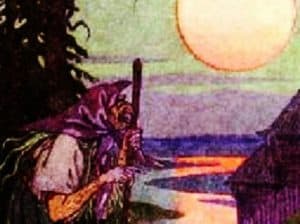Fun with Spooky Fairy
Tales: Learning How Supporting Characters Develop the Plot
&
Contribute to the
Sequence of Events
 Looking for a great story to teach Elementary Students Grades
4th-6th (can use this script with 3rd-8th
grade adjusting the activities accordingly) about the importance of supporting
characters and their role in the development of the plot? Baba Yaga is a fun
spooky story which allows the reader to see how “unique” characters contribute
to the sequence of events through their thoughts and actions. A positive
message while teaching an important literary skill: this is what you will find
in all the Stories to Grow by Stories and Reader’s Theater scripts. This week’s
Fun Fairy Tale for Fall is Baba Yaga, a
classic Folktale from Russia:
Looking for a great story to teach Elementary Students Grades
4th-6th (can use this script with 3rd-8th
grade adjusting the activities accordingly) about the importance of supporting
characters and their role in the development of the plot? Baba Yaga is a fun
spooky story which allows the reader to see how “unique” characters contribute
to the sequence of events through their thoughts and actions. A positive
message while teaching an important literary skill: this is what you will find
in all the Stories to Grow by Stories and Reader’s Theater scripts. This week’s
Fun Fairy Tale for Fall is Baba Yaga, a
classic Folktale from Russia:Baba Yaga:
A young girl, Natasha, is sent into the forest by her evil stepmother to retrieve some string from her “aunt”, the horrible witch Baba Yaga. Once Natasha gets to Baba Yaga’s hut, she meets the servants of the witch, who all delight in her kindness. They develop a plan to help Natasha escape, but what is in store for them once she is gone? Do they all live happily ever after or do they face the wrath of the witch? And what of Natasha when she returns home to deal with her step-mother? Read the exciting tale here!
The content of this tale
prompt skill-building for the Common Core Standards CCSS.ELA-LITERACY.RL:
4.3, 4.9, 5.3, 6.3:
Objectives: Describe
how characters thoughts, words and actions develop the plot and explain how this
contributes to the sequence of events. Analyze different character Points
of View. Compare/Contrast texts with the similar theme: Good vs. Evil.
Anticipatory Set: Have students research the witch Baba
Yaga to understand the background of this historic Russian witch/tale. Have
students draw a picture of the image in their mind of Baba Yaga based on their
research.
Activities: Students
will read the Reader’s Theater Script: Baba Yaga. This Script has Five Scenes
and Nine Characters: Students can be broken into small groups and given two
parts each for the Reader’s Theater Round (20-25mins). Students should then
look at the four supporting characters. Students should then look at the
characters they’ve chosen and Think, Pair Share: How did each their two characters
(either the cat, dog, the gate, or Anastasia) assist in the development of the
story through their actions and conflict resolution? What obstacles did Natasha
face and how did she overcome them with the help of each of these characters? Students
can complete our Character Analysis Map
for each of the characters of their choosing, answering the two discussion questions
above on the sheets.
Closing: Rewrite one of the five scenes from a
different characters’ point of view: Natasha, Grigori, Inga, Baba Yaga or one
of the supporting characters students analyzed in the activities section.
Extension: Have students read another Fairy Tale
surrounding a Witch, such as our tale The Magic Ball or Hansel and Gretel, for
example. What plot details/events, are similar and how are they different? How
is the theme of Good vs. Evil presented in each of the tales?

No comments:
Post a Comment